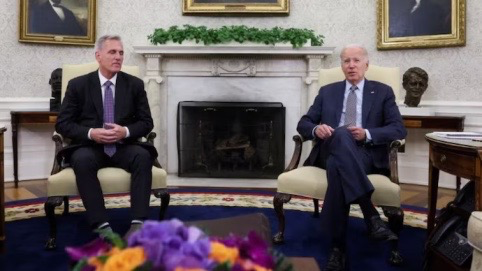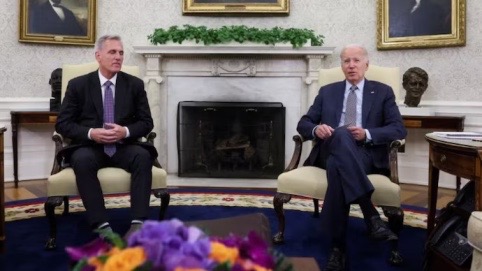
House Speaker Kevin McCarthy, a Republican from California, engages in discussions about the debt limit alongside President Joe Biden in the Oval Office at the White House.(Photo: Reuters)
According to a conservative source, US House of Representatives Speaker Kevin McCarthy is facing doubts about his credibility, which could lead some Republicans to pursue his removal as the leading Republican in Congress. Despite this, McCarthy expressed praise for the recently reached debt ceiling agreement.
US House of Representatives Speaker Kevin McCarthy expressed his approval for the debt ceiling deal he negotiated with President Joe Biden. However, a prominent conservative House member, Representative Ken Buck, cautioned that McCarthy’s credibility issues could lead some Republicans to pursue his removal as the top Republican in Congress.
Buck pointed out that the deal fell short of delivering the deeper spending cuts that McCarthy had promised during his bid for the speaker position earlier this year.
Under the terms of the debt ceiling deal, fiscal 2024 spending will remain at the same level as this year, with a 1% increase projected for fiscal 2025. According to the non-partisan Congressional Budget Office, the deal is expected to reduce deficits by approximately $1.5 trillion over the next decade compared to the current-law baseline forecast.
In late April, House Republicans passed a bill demanding$4.8 trillion in deficiency reduction over the coming 10 times as a condition for raising the debt ceiling. . This move initiated negotiations involving Biden, ultimately leading to the Senate’s approval of the deal on Thursday.
When asked about the possibility of the Freedom Caucus pursuing a vote to remove McCarthy due to the debt ceiling deal, Representative Ken Buck stated on CNN’s State of the Union program that he was uncertain if an immediate motion to vacate would occur. However, Buck emphasized that McCarthy’s credibility issues were well-known.
In order to secure the speakership during a tumultuous election process in January, McCarthy made concessions by agreeing to rule changes that permit a single member to initiate a vote for his removal. This vulnerability to the influence of hardline Republican conservatives sets McCarthy apart in his position as Speaker.
Following the enactment of the legislation that suspends the debt ceiling until January 1, 2025, thereby avoiding a potentially catastrophic U.S. payments default that was anticipated on Monday, several other Republicans came to the defense of Speaker McCarthy. Representative Garret Graves, a Louisiana Republican who played a role in the negotiations for the debt ceiling deal, affirmed on CBS’ “Face the Nation” that Speaker McCarthy’s position is completely secure.
In an interview on Fox News Channel’s “Sunday Morning Futures,” McCarthy commented on the debt ceiling deal, highlighting its significance in reducing non-defense discretionary spending, preventing the hiring of additional Internal Revenue Service agents in the upcoming year, and allocating increased funding for defense and veterans. While acknowledging that the deal is not perfect, McCarthy viewed it as a starting point for addressing spending concerns and expressed the need to continue the work.
Regarding McCarthy’s promise to Republicans to reduce spending levels to those of fiscal 2022 rather than the higher levels agreed upon in the deal for 2024, Buck criticized the agreement, considering it a loss for the party.
To regain the trust of conservatives, Buck emphasized that McCarthy must demonstrate a commitment to responsible spending and refrain from relying on Democratic votes, as he did to pass the debt ceiling suspension. Future actions by McCarthy will be crucial in rebuilding confidence among conservatives.
The debt ceiling deal received strong support from both parties, with 149 House Republicans and 165 Democrats voting in favor. Among the Republican no votes, roughly half came from the conservative Freedom Caucus, while 46 Democrats, primarily progressives, opposed the deal. The Democratic dissenters criticized provisions that imposed strict work requirements on low-income families receiving assistance, potential termination of the student debt payment pause for younger individuals, and streamlined approvals for fossil fuel industry projects opposed by environmentalists, key constituencies for Democrats.
Fitch Ratings announced that it would maintain the U.S. top-tier credit rating on “negative watch” until the third quarter, citing concerns over recurring brinkmanship over the debt ceiling, as well as rising debt and deficits.
When asked about the possibility of a ratings downgrade, White House budget director Shalanda Young stated that the Biden administration does not have control over Fitch’s assessment process but has cautioned about the potential consequences of debt ceiling disputes. Young, who played a role in negotiating the deal, expressed her belief that such brinkmanship is detrimental to the country and the global economy.












